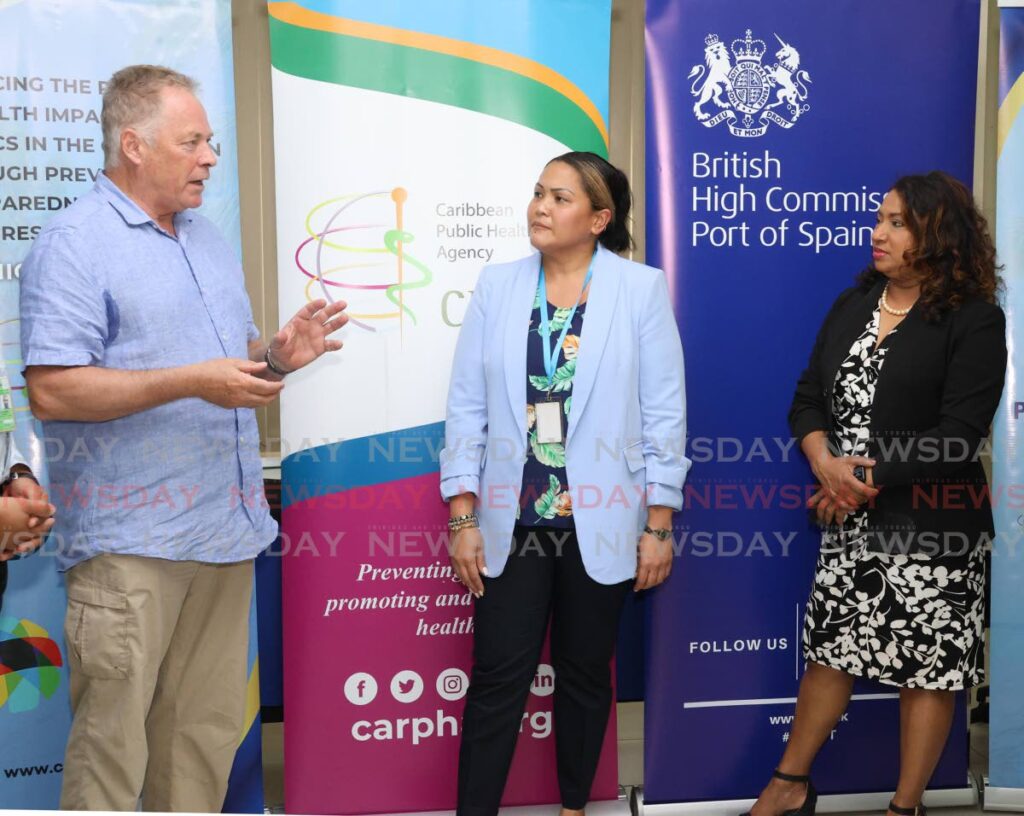UK health agency, Carpha team up to probe antibiotics resistance

The Caribbean Public Health Agency (Carpha) and the UK Health Security Agency (UKHSA) have joined forces to deal with the considerable problem of antimicrobial resistance (AMR).
According to the World Health Organization, antimicrobials – including antibiotics, antivirals, antifungals, and antiparasitics – are medicines used to prevent and treat infectious diseases in humans, animals and plants. AMR occurs when bacteria, viruses, fungi and parasites no longer respond to antimicrobial medicines.
During an interview at Carpha Medical Microbiology Laboratory, Federation Park, Port of Spain, acting interim executive director of Carpha Dr Lisa Indar explained overuse and misuse of antibiotics in treatment in animal feed and in water for plants had an effect on microbial resistance.
“Antibiotics, as we know, are one of our best medicinal treatments. So if you have resistance to antibiotics, obviously that's going to impact your treatment.”
Indar said AMR was a key part of surveillance of global health, by further characterising a “bug” or bacteria to best link a clinical infection to environmental, animal or other sources.
She said Carpha was mandated to improve health and well-being. It tailors intervention to the Caribbean – small, tourism-dependent countries with porous borders – where, if any disease was introduced, it would spread rapidly.
Currently, Carpha has limited lab and workforce capacity. An upgrade was necessary to improve its surveillance.
And so, the Fleming Fund UKHSA/Carpha project will be launched on January 14, in collaboration with the British High Commission.
Indar said previously, antimicrobial testing was done in an “ad hoc” manner, but because it was increasingly important in global health, Carpha was revamping its AMR programme.
“With the launch of this programme, we’re revamping our efforts, but more into an integrated One Health approach, looking at the surveillance, the lab, the prevention, the policies, capacity building, all these different areas so that we have an integrated AMR programme.
She said the One Health approach was about intersectoral collaboration – combining human, animal and environmental health, linking the clinical to the environment, as well as to food and water sources.
She said with Carpha’s Environmental Health and Sustainable Development lab in St Lucia and the organisation networking with those in the veterinary field, it will begin drug-resistant testing and integrate all aspects to determine impacts and use it for proper disease surveillance and timely interventions.
“That said, we cannot operate in isolation. So we are working very closely with our partners, including the UKHSA. We are facilitated through different grants – the Pandemic Fund grant and the UK Fleming grant. And we’re also working very closely with PAHO (Pan American Health Organization) that already is operating in our space in terms of strengthening AMR surveillance in the Caribbean.”
Dr SueMin Nathaniel, acting head of Laboratory Services at Carpha, said the organisation intended to create hubs in which member states would have access to AMR testing and share data.
She said the Carpha lab in Trinidad was the most prepared, and the Medicines Quality Control and Surveillance lab in Jamaica and Environmental Health labs in St Lucia also did some form of the testing.
However, the intention was to integrate the whole system for Carpha to become the centre of excellence in referral testing, technical coordination and data collection for the region. There was a lot of work to be done.
Dr Matthew Dryden, lab specialist at UKHSA, said the key to the partnership was developing surveillance across the region so the resistant bacteria could be identified and their movements are known in a continuous and timely manner.
He and another UKHSA laboratory scientist were in the Caribbean to assess the labs so they could be built up to begin collecting data.
He said Carpha was in a good position to develop public and medical education in the most appropriate use of antibiotics, and it was the only option because the spread of resistance had to be controlled.
Collaboration and funding
Indar said Carpha had a long-standing relationship with the UKHSA and had signed a memorandum of understanding on infectious disease, building capacity, training, vector-borne diseases and other issues, including AMR.
So they were working together to get the project up and running.
Dryden said the UKHSA was delivering the project but much of the funding, £2.25 million, came from the Fleming Fund, a UK aid programme led by the UK Department of Health and Social Care to help low and middle-income countries combat AMR.
The Fleming Fund had over 20 active grants, and this was the first given to the Caribbean.
“The aim of the Fleming Fund is ready to do exactly what we've been talking about, to help countries develop their surveillance, their public health education and the responsible use of antibiotics.
“And to do any of that, you’ve got to know what's going on, obviously, in the region in terms of the bugs. So that's why we're starting with the lab programme and getting bacterial isolates (samples of germs) from all the Caribbean member states to look at the situation.”
Indar added that some of the funding came from the Pandemic Fund, of which Carpha was one of the first recipients last year.
The Pandemic Fund provided funding for improving surveillance, improving lab capacity, and strengthening workforce capacity and partnerships.
She said they hoped to start collecting data by the end of the year and have all three labs fully outfitted in two years.

Comments
"UK health agency, Carpha team up to probe antibiotics resistance"